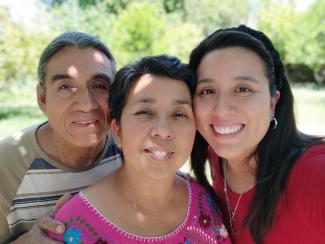
Identity
I am Kolla on my mother’s side and Quechua on my father’s side. I was fortunate to grow up in a family with pride in our identities, worldview, and philosophy of life without feeling shame, violence, or persecution. My name in Quechua, “Ñushpi Quilla,” means “Little Moon.” At the Civil Registry, they didn’t believe my father, who is a native Quechua speaker, when he told them the meaning of my name, so he and my mother had to find a Quechua dictionary (written by an American) and pay 85 dollars to register the “exotic” name.
Community
I grew up with a collective community philosophical understanding, from harmonious coexistence and in reciprocity with my other siblings: human beings, plants, animals, rivers, mountains. In my first year of life, I took part in the haircutting ceremony called Sucharrutuy. Every year in the month of June we hold our Inti Raymi ceremony, and every August we make our offering to Pachamama.
My Elders were part of historic political, social, and cultural movements in Argentina. Thanks to them, I belong to the generations whose rights are recognized by the Argentine state—rights for which we continue to fight and work so they are effectively applied. I had the opportunity to accompany my parents in various activities and events at the local, national, and international levels in the struggle for our rights. My convictions were also shaped by marches and protests alongside retirees, workers, teachers . . . taking to the streets to demand and defend social and collective rights.
Heritage and Interests
I am the daughter of Indigenous artists. My parents introduced me to our culture through music, dance, singing, and poetry, understanding art as a tool for political and social transformation. I grew up in a wonderful artistic and cultural environment full of incredible teachers, transmitters of stories, realities, and critical thinking. Being the daughter of Indigenous artists with clear convictions and a conscious political stance on the meaning of art, culture, and our identity shaped part of who I am and the decisions I make. My mother and my father, Anahí Alancay and Miguel Mayhuay, are, and will always be, my guides in life.
Studies and Professional Life
I studied law, which comes from a western framework. However, I am an Indigenous lawyer who fights for the recognition of our rights, legal systems, and forms of governance from a social, political, empathetic, community-centered, and accessible perspective. In all my training, I have developed and forged from respect and responsibility toward my identity, the struggle and resistance of my ancestors, and my Indigenous siblings.
Recognition of Indigenous Women Activism
I believe that every Indigenous woman is a source of inspiration and a reference point for struggle and resistance. Our historic and contemporary women leaders possess a strength that inspires; examples include Micaela Bastidas, Rigoberta Menchú, Luzmila Carpio, Bartolina Sisa, Berta Cáceres, and Aimé Painé. We are recognized as guardians of nature, bearers of our cultures, defenders of the land. However, being an Indigenous woman today means constantly putting our lives and physical integrity at risk.
Joining the Cultural Survival Family
I am passionate about history, cultural relationships, the revaluation of our worldviews and identities, and Cultural Survival’s international advocacy and publications. I wanted to be part of Cultural Survival’s Advocacy Program because it represented everything I wanted: to work with Indigenous communities from all over the world, carry out local and international advocacy, interact with international human rights and Indigenous Peoples’ organizations, develop comprehensive defense strategies, and carry out our work with respect for and in guarantee of Indigenous Peoples’ right to self-determination. And I did it!
Vision for the Future
Recently, I succeeded in having the University of Cuyo approve a change in the wording of the graduation oath so that it reflects my Indigenous identity and culture: “Do you swear by Pachamama and Jatun Taita Inti, by the memory of your ancestors, by the National Constitution, the rights of Indigenous Peoples, and by your honor?” In the coming years I want to develop and apply my knowledge in different international human rights protection systems and foster dialogue and learning with Indigenous leaders from Abya Yala and the world.
